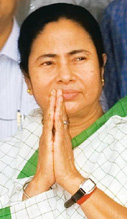KOLKATA, (Reuters) – India’s beleaguered ruling coalition has managed to avoid a major voter backlash over a series of embarrassing corruption scandals, winning three of five regional polls and overturning two communist state governments, results showed yesterday.

The coalition fared worse than expected in Tamil Nadu, where voters punished a regional ally over a $39 billion telecoms scam that paralysed the national parliament for months and hit foreign investment in Asia’s third-largest economy. But the loss came as no surprise. It also lost tiny Pondicherry state.
But it took two states from the communists — West Bengal in the northeast, where the world’s longest serving democratically elected government was finally unseated, and Kerala in the south. It also won the northeastern state of Assam.
Overall, the results were the first good news in months for the suddenly accident-prone government of Prime Minister Manmohan Singh. The main national opposition, the Hindu nationalist Bharatiya Janata Party, scarcely improved on its scant presence in West Bengal and Tamil Nadu, a sign Congress is still the party to beat ahead of 2014 general elections.
“The election results will lead to some stability at the centre,” said R. K. Gupta, managing director of Taurus Mutual Fund. “It gives Congress more muscle to push through its reforms.”
The victory of populist Congress-party ally Mamata Banerjee’s in West Bengal may stabilise the coalition. But the unpredictable maverick, who holds the balance of power in the national parliament, will prove a thorn in the side of government economic reform plans.
“Regional forces are again asserting their importance, and the Congress will have to make all kinds of bargains and compromises to fit them in,” said Ramachandra Guha, fellow of the Indian Institute of Management in Kolkata.
The complicated post election scenarios highlight how Singh faces hard times in his second term amid signs the 78-year-old is increasingly out of touch with both reform-hungry investors and voters angry at inaction over corruption and inflation.





